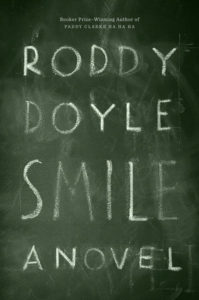 You must be a fan of fine writing to persevere with Smile, Roddy Doyle’s latest, because no genuine drama is apparent, except for the closing scene, which is deus ex machina hogwash. Actually, not even that. At least that classic ending had cultural context, God dips his finger into human affairs and resolves all story problems.
You must be a fan of fine writing to persevere with Smile, Roddy Doyle’s latest, because no genuine drama is apparent, except for the closing scene, which is deus ex machina hogwash. Actually, not even that. At least that classic ending had cultural context, God dips his finger into human affairs and resolves all story problems.
In this case, the ending is equivalent to “…and then I woke up.” It’s totally manufactured and it breaks the implicit contract with the reader who has been coddled along in a context of realism for two hundred pages.
The first-person narrator, Victor, is a divorced, middle-aged man living alone in an apartment in a small town or district in or near Dublin, in contemporary times. He goes to the pub and meets people and drinks and that’s the extent of his life, on the outside, anyway, but the reader is ‘treated’ to his extensive backstory, especially his childhood education in a boarding school where he was sexually abused by the head priest. He represses and rationalizes that period, with Freudian costs.
That tale might have been shocking fifty, or even twenty-five years ago, but not today, so I was mystified as to why that was the main theme. Doyle seems to have been trying to portray how seriously deep the psychological scars of such childhood trauma can be, not merely document that such things happened in boarding schools. If so, he missed the mark, in my estimation, missed it over the top. The psychological consequences of repressed shame might manifest in many ways but psychotic hallucination and delusion would not be among them. It wasn’t believable and it stood out like the contrivance of a writer who had lost his way.
In a parallel backstory, we see Victor’s long-time relationship with a dynamic and beautiful woman, Rachel, who he was always amazed stayed with him, so undeserving of her fame and her charm he was. That was an interesting relationship dynamic and could have been developed much more. But it wasn’t. We saw only endlessly repetitive episodes of crazed, passionate sex. We never did understand what Rachel saw in him until the whole story was undone with the phony ending. So that thread was also a disappointment.
As for the writing, it is seductive at first, but quickly becomes repetitively quirky and little more than recitation of quotidian detail and vapid chit-chat. This might have been successful as a tight story of under 10K words. At 200 printed pages, it’s not my pint of beer, I’m afraid.
Doyle, Roddy (2017). Smile. New York: Viking/Penguin/Random (pp. 214).
